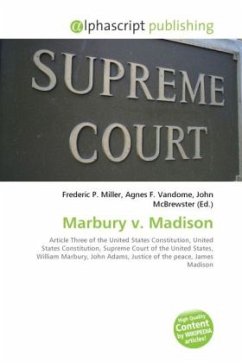Marbury v. Madison, 5 U.S. (1 Cranch) 137 (1803) is a landmark case in United States law. It formed the basis for the exercise of judicial review in the United States under Article III of the Constitution. This case resulted from a petition to the Supreme Court by William Marbury, who had been appointed by President John Adams as Justice of the Peace in the District of Columbia but whose commission was not subsequently delivered. Marbury petitioned the Supreme Court to force Secretary of State James Madison to deliver the documents, but the court, with John Marshall as Chief Justice, denied Marbury's petition, holding that the part of the statute upon which he based his claim, the Judiciary Act of 1789, was unconstitutional. Marbury v. Madison was the first time the Supreme Court declared something "unconstitutional," and established the concept of judicial review in the U.S. (the idea that courts may oversee and nullify the actions of another branch of government). The landmark decision helped define the "checks and balances" of the American form of government.
Bitte wählen Sie Ihr Anliegen aus.
Rechnungen
Retourenschein anfordern
Bestellstatus
Storno








